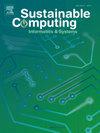Multi-objective hybrid green anaconda skill optimization enabled energy and cache based QoS aware routing in delay tolerant–IoT network
IF 5.7
3区 计算机科学
Q1 COMPUTER SCIENCE, HARDWARE & ARCHITECTURE
引用次数: 0
Abstract
Delay-Tolerant Network (DTN) is developed to overcome the challenges of environments where classical networking models fail due to unstable connectivity and high latency. The DTN offers stable connections between nodes and operates effectively in scenarios where nodes frequently experience disruptions or only sporadic communication opportunities. However, the classical techniques allowed limited data communication and did not apply to the network with reduced resources and which had low delivery rates and high delays. Therefore, this research aims to develop a Green Anaconda Skill Optimization (GASO) for an eQoS-aware routing solution for a DTN-IoT network. Initially, the DTN-IoT network is simulated by considering energy and mobility models. Then, for predicting the energy, Recurrent Radial Basis Function Networks (RRBFN) is used. After that, Cluster Head (CH) selection is executed by GASO, considering multiple objectives, like cache ratio, residual energy, predicted energy, throughput, distance, trust factors, and delay. Finally, GASO is employed for routing, and the above-mentioned multi-objectives are considered. Here, the GASO is established through the fusion of Green Anaconda Optimization (GAO) and Skill Optimization Algorithm (SOA). The evaluation results highlight that the GASO accomplished a reduced distance of 0.253 m, low energy consumption of 0.783 J, and minimal delay of 0.270 sec, with an increased throughput of 0.313 Mbps.
多目标混合绿蟒蛇技能优化实现了容延迟物联网网络中基于能量和缓存的QoS感知路由
容忍延迟网络(Delay-Tolerant Network, DTN)是为了克服传统网络模型因连接不稳定和时延高而无法实现的环境挑战而开发的。DTN在节点之间提供稳定的连接,并在节点频繁中断或只有零星通信机会的情况下有效运行。然而,传统技术允许有限的数据通信,并不适用于资源较少、传输速率低、延迟高的网络。因此,本研究旨在为DTN-IoT网络的eqos感知路由解决方案开发绿色蟒蛇技能优化(GASO)。首先,通过考虑能源和移动模型来模拟DTN-IoT网络。然后,利用循环径向基函数网络(RRBFN)进行能量预测。之后,由GASO执行簇头(CH)选择,考虑多个目标,如缓存比、剩余能量、预测能量、吞吐量、距离、信任因素和延迟。最后,采用GASO进行路由,并考虑了上述多目标。本文将绿色蟒蛇优化算法(Green Anaconda Optimization, GAO)和技能优化算法(Skill Optimization Algorithm, SOA)融合,建立了GASO。评估结果表明,GASO实现了0.253 m的距离缩短,0.783 J的能耗降低,0.270 秒的最小延迟,吞吐量提高了0.313 Mbps。
本文章由计算机程序翻译,如有差异,请以英文原文为准。
求助全文
约1分钟内获得全文
求助全文
来源期刊

Sustainable Computing-Informatics & Systems
COMPUTER SCIENCE, HARDWARE & ARCHITECTUREC-COMPUTER SCIENCE, INFORMATION SYSTEMS
CiteScore
10.70
自引率
4.40%
发文量
142
期刊介绍:
Sustainable computing is a rapidly expanding research area spanning the fields of computer science and engineering, electrical engineering as well as other engineering disciplines. The aim of Sustainable Computing: Informatics and Systems (SUSCOM) is to publish the myriad research findings related to energy-aware and thermal-aware management of computing resource. Equally important is a spectrum of related research issues such as applications of computing that can have ecological and societal impacts. SUSCOM publishes original and timely research papers and survey articles in current areas of power, energy, temperature, and environment related research areas of current importance to readers. SUSCOM has an editorial board comprising prominent researchers from around the world and selects competitively evaluated peer-reviewed papers.
 求助内容:
求助内容: 应助结果提醒方式:
应助结果提醒方式:


